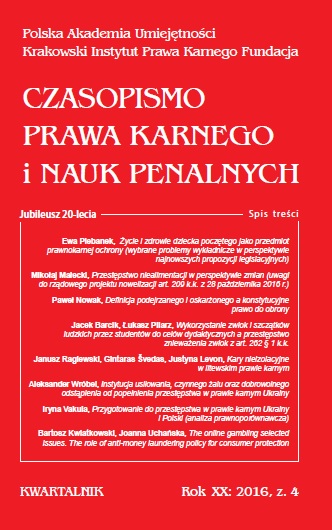The online gambling selected issues.
The role of anti-money laundering policy for consumer protection
The online gambling selected issues.
The role of anti-money laundering policy for consumer protection
Author(s): Bartosz Kwiatkowski, Joanna UchańskaSubject(s): Criminal Law
Published by: Polska Akademia Umiejętności / Krakowski Instytut Prawa Karnego Fundacja
Keywords: digital single market; money laundering; AML; EU CPL; online gambling
Summary/Abstract: The paper describes the right of every consumer to have the best conventional and online products and services, include gambling. That right, in the opinion of authors, means that gambling is to be honest, and that has to be driven by fair share, both for casino owners and their users. The case study proved that online gambling may pose a risk of many increasing addictions and/or fraud or money laundering delinquency. However, authors reckon that the risk of dysfunctional and pathological phenomenon shall not lead to banning gambling entirely or partly. The comparative analysis leaded to the conclusion that the early-bird AML system served only the public interests of the country, including only the supporting of counteracting crimes and maintaining the stability of the financial system, or the protection of economic activity of business. The AML was described as the helpful and useful instrument for the public interest which is often understood and used as a consumer protection tool. Authors tried to prove that the AML and CPL combine each other and regardless of imposing some restriction (e.g. the limiting of privacy) intend to one direction – the guarantee of realization of common, public welfare not only for consumers, but also for entrepreneurs which both are central and leading actors of the internal (single) market as well as the digital single market.Artykuł opisuje prawo dostępu każdego konsumenta do najlepszych produktów i usług tak konwencjonalnych, jak i internetowych, w tym gier hazardowych. Prawo to, w opinii autorów, oznacza, że gry hazardowe powinny być uczciwe oraz że muszą być napędzane przez sprawiedliwy podział zysków między właścicielami kasyn i graczami. Zbadane przypadki wykazują, że hazardowa działalność internetowa może przyczynić się do wzrostu liczby uzależnień lub przestępczości, w tym oszustw i prania pieniędzy. Niemniej, według autorów tekstu, ryzyko dysfunkcyjnych i patologicznych zjawisk nie może być powodem wprowadzenia całkowitego albo częściowego zakazu prowadzenia działalność hazardowej. Analiza porównawcza prowadzi do wniosku, że mimo iż regulacje przeciwko praniu pieniędzy (AML) były wprowadzane, aby służyć interesowi publicznemu, poprzez zwalczanie przestępczości oraz utrzymanie stabilności systemu finansowego i ochronę obrotu gospodarczego. Jednakże AML to także pomocne i przydatne narzędzie w ochronie praw konsumentów. Autorzy starali się udowodnić, że AML i prawo ochrony konsumentów łączą się ze sobą i mimo pewnych ograniczeń, które nakładają na konsumentów (np. ograniczanie prywatności) zmierzają w jednym kierunku - gwarancji realizacji wspólnego dobra, nie tylko dla konsumentów, ale także dla przedsiębiorców, będących głównymi aktorami jednolitego rynku wewnętrznego, jak również jednolitego rynku cyfrowego.
Journal: Czasopismo Prawa Karnego i Nauk Penalnych
- Issue Year: 20/2016
- Issue No: 4
- Page Range: 163-179
- Page Count: 17
- Language: English

